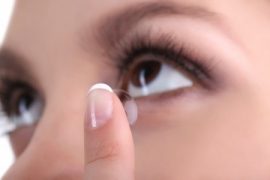A new study presented at the annual meeting of the American Society for Microbiology has begun to piece together the puzzle, however, by examining the colonies of bacteria living on the eyes of people who wear contact lenses and those who do not. Their findings add to the growing knowledge that modern lifestyles are tinkering with our microbiomes… with potentially dangerous effects.
Wearing Contact Lenses Alters Your Eyes’ Microbiome
After comparing the quantity and types of bacteria on the surface of the eyes in contact-lens wearers and non-wearers, those wearing contacts had higher microbial diversity. The contact wearers’ eye microbiome resembled more closely the microbiome of the skin than that of the eye, with three times more of the following:2
- Methylobacterium, found in soil, sewage, and leaves
- Lactobacillus, found in the digestive and urinary tract
- Acinetobacter, found in soil and water (and thought to be responsible for the majority of infections)
- Pseudomonas, found widely in the environment and may lead to ear infections and other serious issues, including corneal infection
This is an important news for the 71 million contact lens wearers worldwide,3 as some of the increased microbes are linked to inflammatory eye conditions, such as conjunctivitis, keratitis (corneal infection), and endophthalmitis. This may be one mechanism by which using contact lenses increases the risk of eye diseases and infections.
The altered microbiome is thought to be the result of fingers habitually touching the eye, transferring in microbes that wouldn’t ordinarily exist in such high numbers. It could also be due to alterations to the eyes’ immune system due to the lens’ direct pressure on the eye.4 Another alternative is the contact lenses may favor skin-like bacteria in the eye.
Senior study investigator Maria Gloria Dominguez-Bello, a microbiologist at NYU Langone Medical Center, stated:5
“Our research clearly shows that putting a foreign object, such as a contact lens, on the eye is not a neutral act.”Many Health Problems Can Arise From an Imbalanced Microbial Community
It’s not only your eyes that may suffer from a disrupted microbiome. Researchers have discovered that microbes of all kinds play instrumental roles in the functioning of your body. For example, beneficial bacteria, also known as probiotics, have been shown to:
- Counteract inflammation and control the growth of disease-causing bacteria
- Produce vitamins, absorb minerals, and eliminate toxins
- Control asthma and reduce risk of allergies
- Benefit your mood and mental health
- Normalize your weight
Research is now showing us that the complex interactions of all of these microorganisms, both bacterial and non-bacterial, can quite literally make or break your health.
Researchers are actually starting to recognize gut microbiota as one of your unappreciated “organs.”10 It’s even been suggested that it would be more apt to view your body as a “super organism” composed of symbiotic microorganisms.
The beneficial nature of this symbiotic relationship extends beyond the so-called “friendly” bacteria. Even microorganisms you’d typically consider “bad” or pathogenic can play an integral role in the maintenance of health and disease prevention. In addition:
- Your microbiota influences your cancer susceptibility. Gut microorganisms even appear to impact the efficacy of various cancer treatments.
- Your microbiota influences your weight. Obese people and thin people tend to have different communities of microorganisms
- Your microbiota influences your mental health. Even severe and chronic mental health problems, including post-traumatic stress disorder (PTSD), might be eliminated through the use of certain probiotics
When you eat too many grains, sugars, and processed foods, these foods serve as “fertilizer” for pathogenic microorganisms and yeast, causing them to rapidly multiply. The best way to support microbial diversity is to instead eat a varied diet, including plenty of fiber-rich vegetables and fermented foods while avoiding antibiotics. Dietary changes are known to impact your microbial diversity drastically in as little as two weeks, but it’s unknown whether this has any effect on the microbiome of the eyes.
NEXT: Are There Other Health Risks of Wearing Contact Lenses?
Wearing Contact Lenses? You Better Read This!



